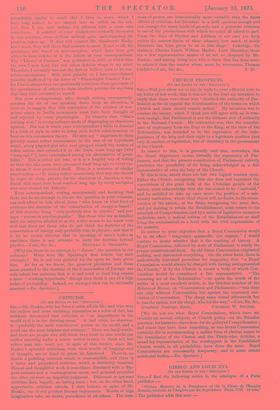CRITICISM.
[TO THE EDITOR OF THE "SPECTATOR."]
Sin,—Mr. Ruskin, who has been a critic all his life, and who won his earliest and most enduring reputation as a critic of Art, has suddenly discovered that criticism is " as impertinent in the world as it is in the drawing-room." A bad critic, he observes, is " probably the most mischievous person in the world, and a good one the most helpless and unhappy." These are bard words, and there are people who will think they must be true words (an author smarting under a severe review is sure to think so), but critics may take heart yet, in spite of this verdict, since Mr. Ruskin's splendid criticisms, with their wealth of language and of thought, are at hand to attest its falsehood. There is, no doubt, a peddling criticism which is contemptible, and there is a hasty and prejudiced criticism which is distinctly immoral. Honest and thoughtful work is sometimes dismissed with a flip- pant sarcasm and a contemptuous sneer, and personal prejudice too often prevents an impartial judgment. Dishonest or ignorant criticism does, happily, no lasting harm ; but, on the other hand, appreciative criticism affords, I dare believe, in spite of Mr. Ruskin, one of our greatest literary enjoyments. Works of high imagination take, no doubt, precedence of all others. The crea- tions of genius are immeasurably more valuable than the finest efforts of criticism, but literature is a field spacious enough and rich enough for many kinds of growth, and a generous criticism is one of the productions with which we could ill afford to part. From the days of Dryden and Addison to our own (to keep within the narrow limits of these islands), how much of noble literature has been given to us in this shape ! Coleridge, De Quincey, Charles Lamb, William Hazlitt, Lord Macaulay, these are a few representative names of an art so despised by Mr. Ruskin ; and among living men who is there that has done more to adorn it than the master whom most he reverences, Thomas.






































 Previous page
Previous page